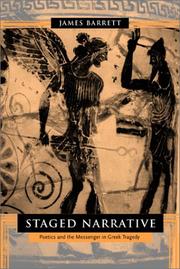| Listing 1 - 2 of 2 |
Sort by
|
Book
ISBN: 0823255689 0823261204 0823255697 0823255670 9780823255696 9780823255689 9780823255672 9780823255658 9780823255665 0823255654 0823255662 Year: 2014 Publisher: New York
Abstract | Keywords | Export | Availability | Bookmark
 Loading...
Loading...Choose an application
- Reference Manager
- EndNote
- RefWorks (Direct export to RefWorks)
Today we urgently need to reevaluate the human place in the world in relation to other animals. This book puts Maurice Merleau-Ponty’s philosophy into dialogue with literature, evolutionary biology, and animal studies. In a radical departure from most critical animal studies, it argues for evolutionary continuity between human cultural and linguistic behaviors and the semiotic activities of other animals.In his late work, Derrida complained of philosophers who denied that animals possessed such faculties, but he never investigated the wealth of scientific studies of actual animal behavior. Most animal studies theorists still fail to do this. Yet more than fifty years ago, Merleau-Ponty carefully examined the philosophical consequences of scientific animal studies, with profound implications for human language and culture. For him, “animality is the logos of the sensible world: an incorporated meaning.” Human being is inseparable from animality.This book differs from other studies of Merleau-Ponty by emphasizing his lifelong attention to science. It shows how his attention to evolutionary biology and ethology anticipated recent studies of animal cognition, culture, and communication.
Merleau-Ponty, Maurice, --- Bacchae. --- Gilgamesh. --- Life of Pi. --- Meleau_Ponty. --- animal studies. --- animality. --- animals and culture. --- animals. --- human evolution. --- language.

ISBN: 0520231805 0520927931 9786612356582 1282356585 159734916X 9780520927933 0585419647 9780585419640 9780520231801 9781597349161 6612356588 9781282356580 Year: 2002 Publisher: Berkeley University of California Press
Abstract | Keywords | Export | Availability | Bookmark
 Loading...
Loading...Choose an application
- Reference Manager
- EndNote
- RefWorks (Direct export to RefWorks)
The messenger who reports important action that has occurred offstage is a familiar inhabitant of Greek tragedy. A messenger informs us about the death of Jocasta and the blinding of Oedipus, the madness of Heracles, the slaughter of Aigisthos, and the death of Hippolytus, among other important events. Despite its prevalence, this conventional figure remains only little understood. Combining several critical approaches-narrative theory, genre study, and rhetorical analysis-this lucid study develops a synthetic view of the messenger of Greek tragedy, showing how this role illuminates some of the genre's most persistent concerns, especially those relating to language, knowledge, and the workings of tragic theater itself. James Barrett gives close readings of several plays including Aeschylus's Persians, Sophocles' Electra and Oedipus Tyrannus, and Euripides' Bacchae and Rhesos. He traces the literary ancestry of the tragic messenger, showing that the messenger's narrative constitutes an unexplored site of engagement with Homeric epic, and that the role illuminates fifth-century b.c. experimentation with modes of speech. Breaking new ground in the study of Athenian tragedy, Barrett deepens our understanding of many central texts and of a form of theater that highlights the fragility and limits of human knowledge, a theme explored by its use of the messenger.
Greek drama (Tragedy) --- Messengers in literature. --- Narration (Rhetoric) --- Rhetoric, Ancient. --- History and criticism. --- History --- -Messengers in literature --- Rhetoric, Ancient --- Classical languages --- Greek language --- Greek rhetoric --- Latin language --- Latin rhetoric --- Narrative (Rhetoric) --- Narrative writing --- Rhetoric --- Discourse analysis, Narrative --- Narratees (Rhetoric) --- History and criticism --- Tragédie grecque --- Messagers dans la littérature --- Narration --- Rhétorique ancienne --- Histoire et critique --- Ancient rhetoric --- Messengers in literature --- achilles. --- aeschylus. --- ancient greece. --- ancient world. --- arete. --- athenian tragedy. --- bacchae. --- classicism. --- drama. --- electra. --- epic. --- epistemology. --- euripides. --- genre study. --- gods and goddesses. --- greek tragedy. --- hellenism. --- homer. --- homeric epic. --- hubris. --- human knowledge. --- literary ancestry. --- literary criticism. --- literature. --- messenger. --- mythology. --- narrative poetics. --- narrative theory. --- nonfiction. --- oedipus rex. --- oedipus tyrannus. --- oedipus. --- performing arts. --- persians. --- poetry. --- rhesos. --- rhetoric. --- rhetorical analysis. --- sophocles. --- theater. --- tragedy. --- tragic messenger.
| Listing 1 - 2 of 2 |
Sort by
|

 Search
Search Feedback
Feedback About UniCat
About UniCat  Help
Help News
News